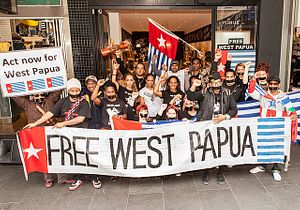Indonesian president Joko “Jokowi” Widodo is now on a weekend visit to the restive eastern region of the province of Papua to begin to address a half-century long separatist insurgency that continues to simmer there.
Jokowi is in Papua to attend national Christmas celebrations, which he decided to hold there for the first time (they are usually held in Jakarta). But he is also using the visit as an opportunity to confront Indonesia’s troubling legacy in Papua, long a black mark on its human rights record.
For decades, a deadly cycle of violence has persisted in Papua due to socioeconomic and political grievances toward the state and the heavy-handedness of security forces, which appear to operate with impunity. Jokowi had vowed to tackle the problem head on in the run-up to the presidential election, floating ideas such as lifting restrictions on the foreign press and constructing a new presidential palace near the Papuan capital of Jayapura.
Jokowi’s weekend visit is a good chance to begin to deliver on that promise, and his full itinerary suggests that he and his team recognize that. On Friday, even before leaving Jakarta for Papua, he summoned church leaders to get their input on what should be addressed. Jokowi’s trip itself will comprise mainly visits to three cities. Following his arrival in Jayapura on December 27, the president will give a speech to open the Christmas celebration in Papua Bangkit Square at Sentani Airport. He will then visit the city before continuing on to Wamena in Jayawijaya regency and Sorong in West Papua, where the trip will end on December 29.
During the trip, he will engage in a range of activities, such as holding meetings with Papuan public figures and volunteers and commissioning several traditional markets. He will also reportedly conduct blusukan (impromptu visits) during his time there to hear the voices of local residents despite lingering security concerns – a defining feature of Jokowi’s people-centric approach to governance.
Despite the encouraging signs so far, some are already questioning whether any of this symbolism will translate into substantive policy changes. The Jokowi administration has come under fire recently for its ineffectual response in addressing a December 8 incident in Paniai, where Indonesian military and police opened fire on hundreds of unarmed protesters, killing five. Some students and church leaders in Papua had even told Jokowi to cancel his visit in the face of this inaction.
Others say that he will need to follow his visit with tangible deliverables. Human Rights Watch implored Jokowi to create a joint inquiry into the December 8 shootings. And the Presidium of the Papua Council (PDP) urged him to consider releasing political prisoners and reviving a commission for truth and reconciliation.
“If all this could be accepted and implemented, the people of Papua would have the confidence in the president…Promises would not solve anything,” Thaha Alhamid, the secretary general of the PDP, said earlier this month.

































